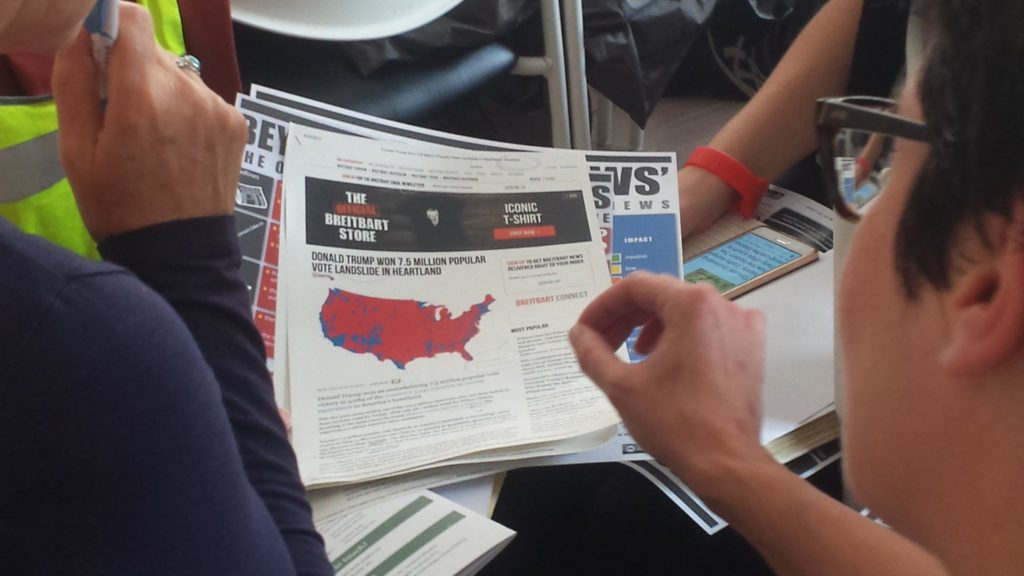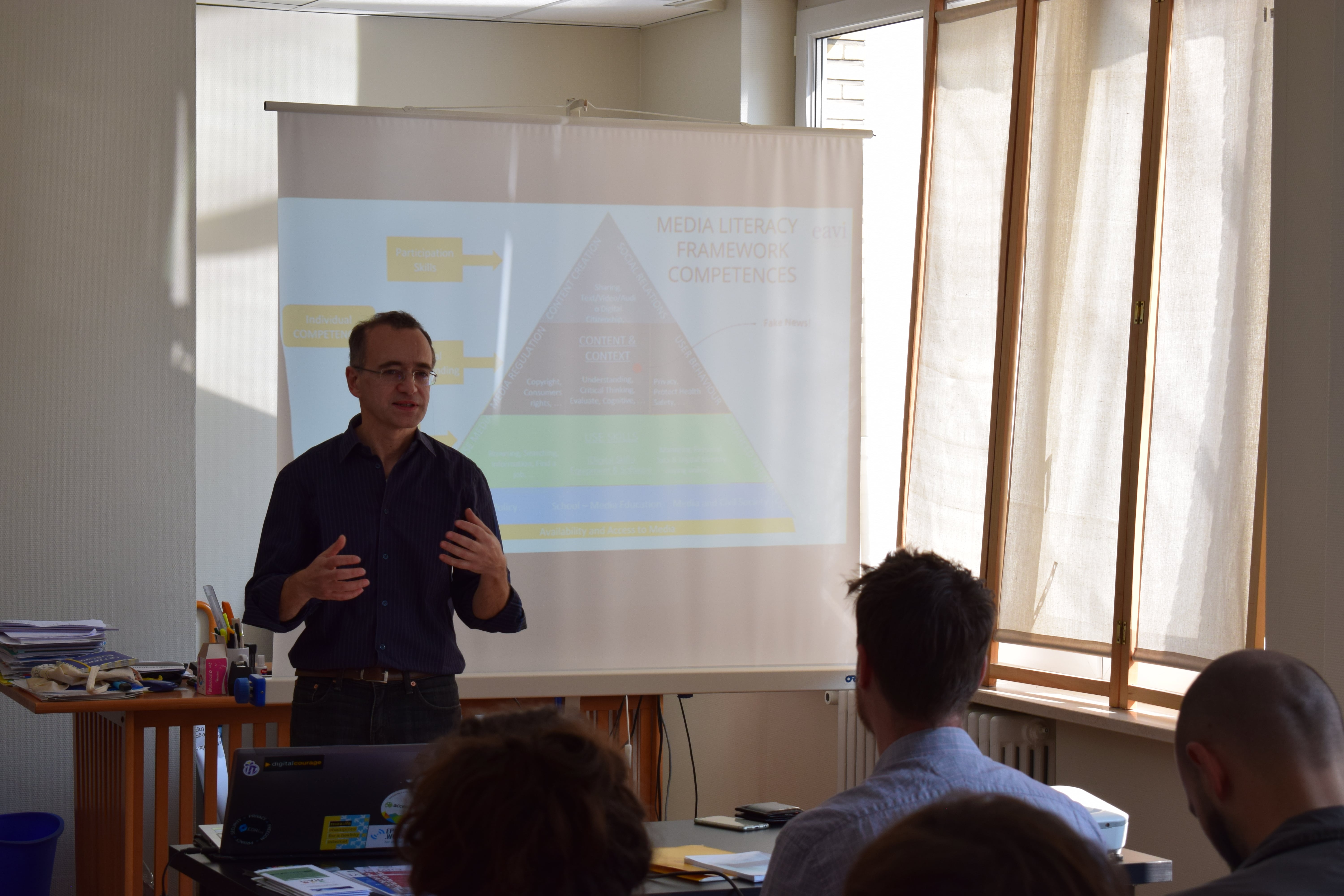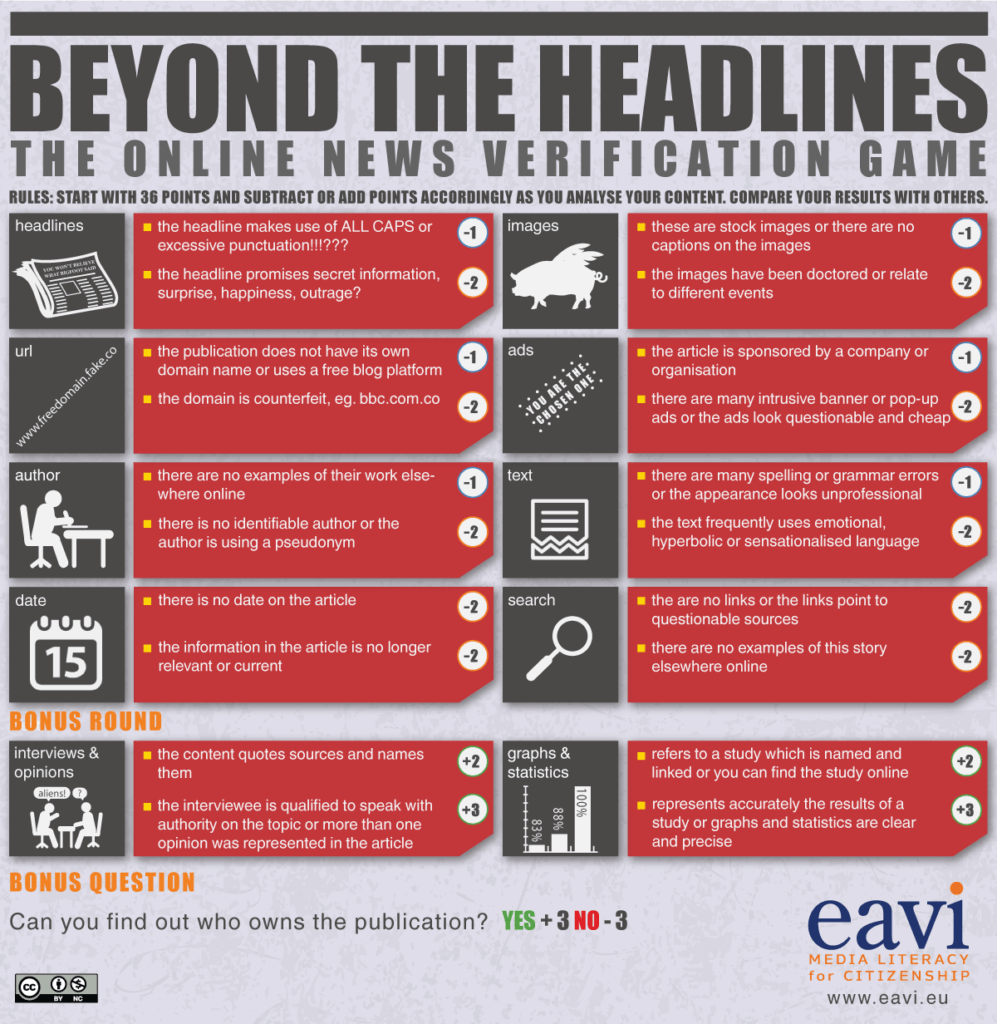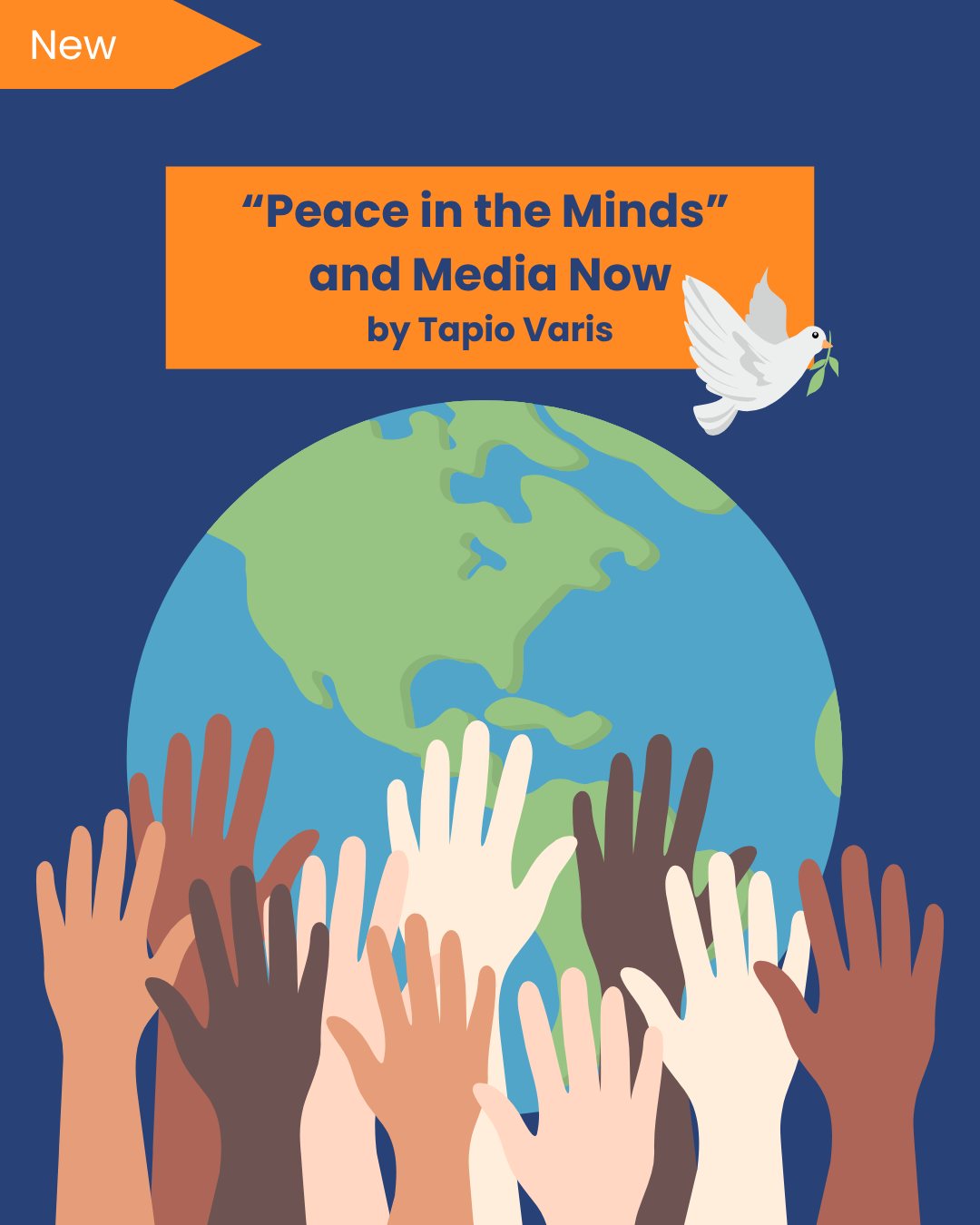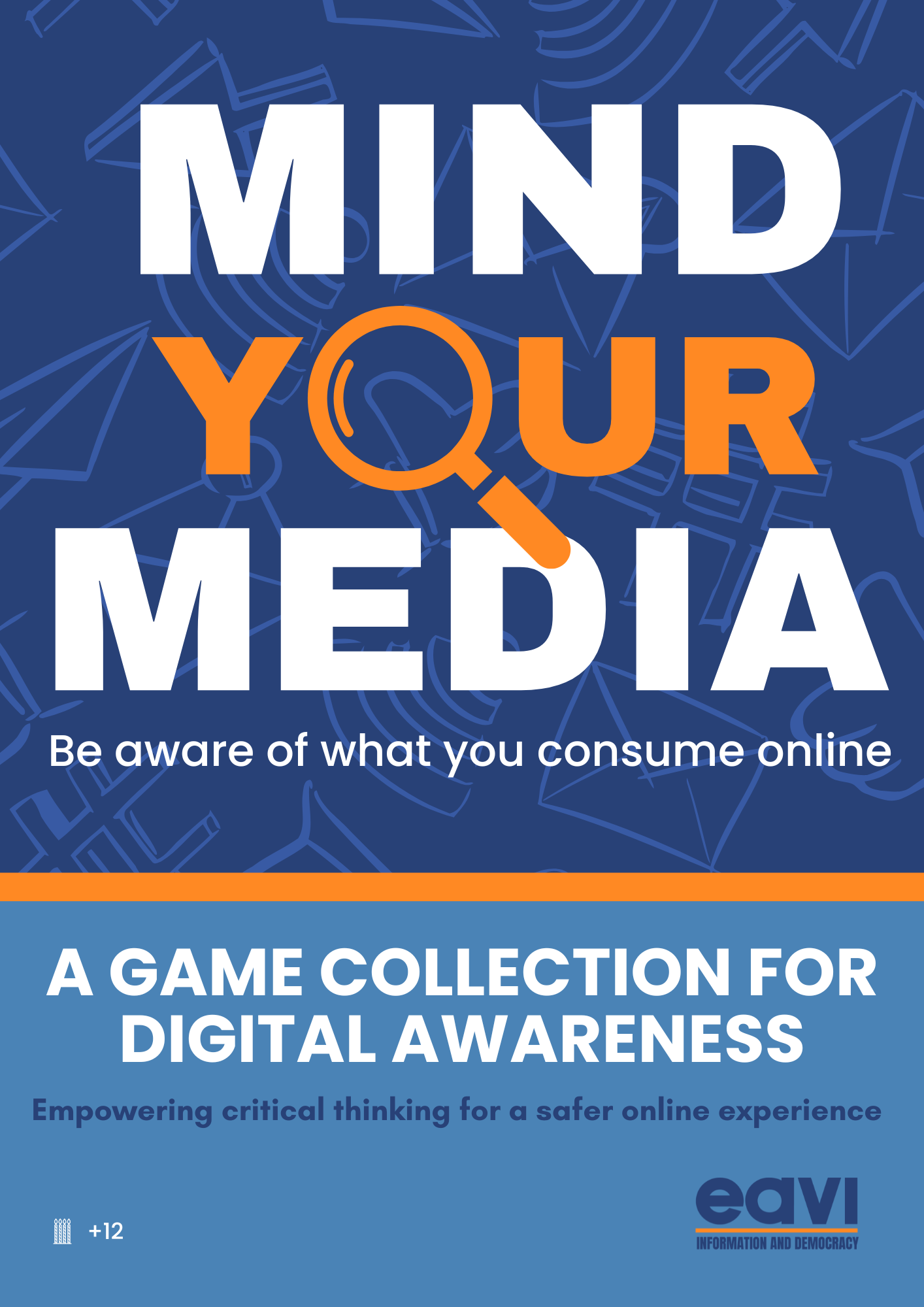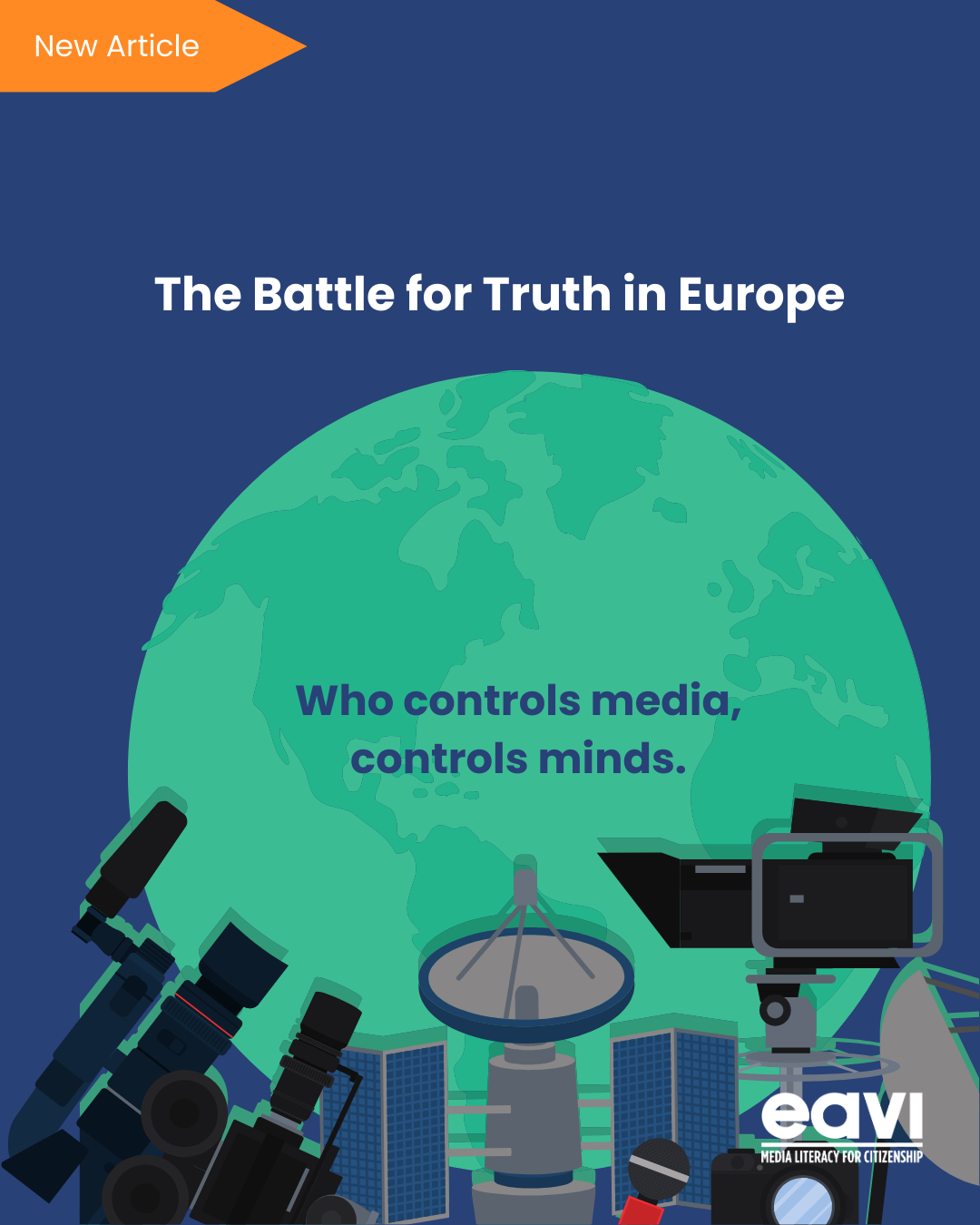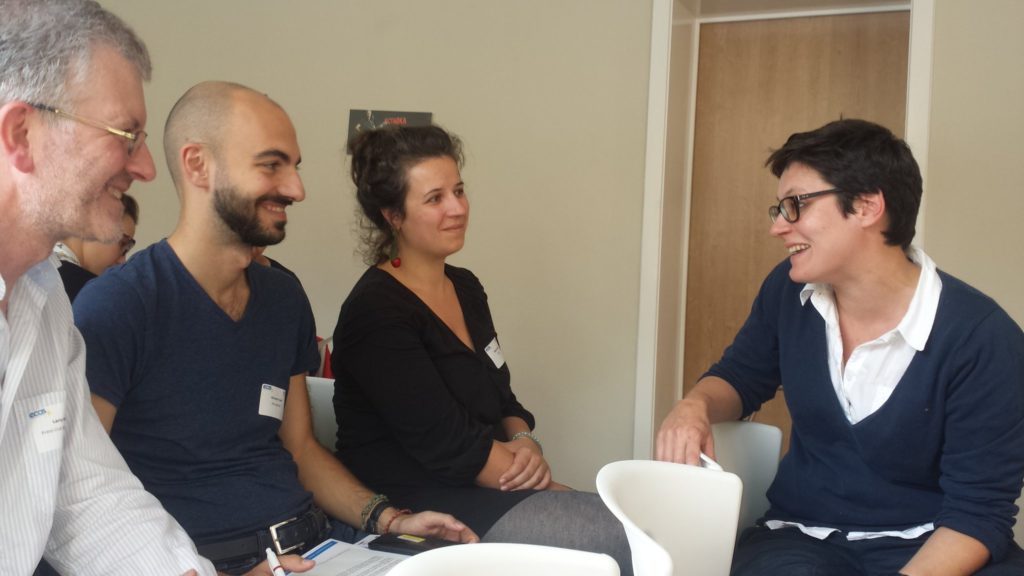
EAVI’s Naomi Thompson discussing fake news with participants – “It’s easier to convince somebody of a lie than to convince them that they have been lied to”
EAVI’s Beyond Fake News Workshop took place on 26 September 2017, hosted by ECAS. It was attended by 20 professionals from various international organisations, local and national governments and NGOs.
Paolo Celot, Secretary General of EAVI, opened the workshop, placing the issue of fake news in the context of media literacy and noting that the phenomenon of fake news as it exists today is not the cause but a symptom of societal ills. Commercial and political interests are relevant, and policy makers are late in realising the scale and impact of misinformation on our democracies. However, establishment politicians and media players now fear that they can lose their power to influence public opinion and it seems that now they will take more responsibility to tackle the issue.
Social media platforms have been unwilling to take responsibility for the content published and it is unrealistic to hope that they will self-regulate effectively.
Media literacy can act on both the production of the news (journalists) and on making readers more aware when navigating the new media environment.
Therefore media literacy is highly necessary but insufficient to halt the progress and effectiveness of fake news. Media literacy should not be thought as universal panacea – this phenomenon must be addressed from all angles.
Luc Steinberg also from EAVI then gave a brief explanation of how fake news fits into the media literacy framework and the hallmarks of fake news, presenting EAVI’s Beyond Fake News infographic. In addition, we had the chance to present our newest graphic/game Beyond The Headlines.
Luc went on to discuss the important role of fact-checkers such as fullfact.org and Snopes, and how the techniques they use to determine the veracity of information can be used to teach media literacy competencies, especially critical thinking and technical skills.
Naomi Thompson, then led a practical exercise where the participants were each given a copy of our Beyond The Headlines game, and one or two news articles each of varying in order to tally the scores of their fake news articles, identifying which hallmarks to look out for, and which identifying features gave the piece away as fake news.
The feedback we received for the workshop was very valuable for EAVI to continue to develop ways to teach media literacy-related issues. The participants found it helpful and interesting and many asked for EAVI to deliver more workshops on fake news and across other subjects relating to media literacy.
You may find a pdf copy of the workshop slides here and a pdf copy of our new Beyond the Headlines – Online News Verification Game here.

EAVI’s Naomi Thompson discussing fake news with participants – “It’s easier to convince somebody of a lie than to convince them that they have been lied to”
EAVI’s Beyond Fake News Workshop took place on 26 September 2017, hosted by ECAS. It was attended by 20 professionals from various international organisations, local and national governments and NGOs.
Paolo Celot, Secretary General of EAVI, opened the workshop, placing the issue of fake news in the context of media literacy and noting that the phenomenon of fake news as it exists today is not the cause but a symptom of societal ills. Commercial and political interests are relevant, and policy makers are late in realising the scale and impact of misinformation on our democracies. However, establishment politicians and media players now fear that they can lose their power to influence public opinion and it seems that now they will take more responsibility to tackle the issue.
Social media platforms have been unwilling to take responsibility for the content published and it is unrealistic to hope that they will self-regulate effectively.
Media literacy can act on both the production of the news (journalists) and on making readers more aware when navigating the new media environment.
Therefore media literacy is highly necessary but insufficient to halt the progress and effectiveness of fake news. Media literacy should not be thought as universal panacea – this phenomenon must be addressed from all angles.
Luc Steinberg also from EAVI then gave a brief explanation of how fake news fits into the media literacy framework and the hallmarks of fake news, presenting EAVI’s Beyond Fake News infographic. In addition, we had the chance to present our newest graphic/game Beyond The Headlines.
Luc went on to discuss the important role of fact-checkers such as fullfact.org and Snopes, and how the techniques they use to determine the veracity of information can be used to teach media literacy competencies, especially critical thinking and technical skills.
Naomi Thompson, then led a practical exercise where the participants were each given a copy of our Beyond The Headlines game, and one or two news articles each of varying in order to tally the scores of their fake news articles, identifying which hallmarks to look out for, and which identifying features gave the piece away as fake news.
The feedback we received for the workshop was very valuable for EAVI to continue to develop ways to teach media literacy-related issues. The participants found it helpful and interesting and many asked for EAVI to deliver more workshops on fake news and across other subjects relating to media literacy.
You may find a pdf copy of the workshop slides here and a pdf copy of our new Beyond the Headlines – Online News Verification Game here.

EAVI’s Naomi Thompson discussing fake news with participants – “It’s easier to convince somebody of a lie than to convince them that they have been lied to”
EAVI’s Beyond Fake News Workshop took place on 26 September 2017, hosted by ECAS. It was attended by 20 professionals from various international organisations, local and national governments and NGOs.
Paolo Celot, Secretary General of EAVI, opened the workshop, placing the issue of fake news in the context of media literacy and noting that the phenomenon of fake news as it exists today is not the cause but a symptom of societal ills. Commercial and political interests are relevant, and policy makers are late in realising the scale and impact of misinformation on our democracies. However, establishment politicians and media players now fear that they can lose their power to influence public opinion and it seems that now they will take more responsibility to tackle the issue.
Social media platforms have been unwilling to take responsibility for the content published and it is unrealistic to hope that they will self-regulate effectively.
Media literacy can act on both the production of the news (journalists) and on making readers more aware when navigating the new media environment.
Therefore media literacy is highly necessary but insufficient to halt the progress and effectiveness of fake news. Media literacy should not be thought as universal panacea – this phenomenon must be addressed from all angles.
Luc Steinberg also from EAVI then gave a brief explanation of how fake news fits into the media literacy framework and the hallmarks of fake news, presenting EAVI’s Beyond Fake News infographic. In addition, we had the chance to present our newest graphic/game Beyond The Headlines.
Luc went on to discuss the important role of fact-checkers such as fullfact.org and Snopes, and how the techniques they use to determine the veracity of information can be used to teach media literacy competencies, especially critical thinking and technical skills.
Naomi Thompson, then led a practical exercise where the participants were each given a copy of our Beyond The Headlines game, and one or two news articles each of varying in order to tally the scores of their fake news articles, identifying which hallmarks to look out for, and which identifying features gave the piece away as fake news.
The feedback we received for the workshop was very valuable for EAVI to continue to develop ways to teach media literacy-related issues. The participants found it helpful and interesting and many asked for EAVI to deliver more workshops on fake news and across other subjects relating to media literacy.
You may find a pdf copy of the workshop slides here and a pdf copy of our new Beyond the Headlines – Online News Verification Game here.

